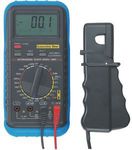Digitor Automotive Multimeter Q1585
Comes with an inductive clamp lead. A quick Google gives positive remarks in car forums.
Functions: ACV, ACA, DCV, DCA, Resistance, RPM, Dwell angle, Duty cycle, Frequency, Temperature, Continuity, Diode test
Comes with: probe leads, clip leads, inductive clamp, temperature probe, rubber holster, 9V battery
Dick Smith eBay:
Pickup: $32.03 with 15% CPICKUP15 code
Delivered: $44.63 ($37.68 + $6.95 shipping)
Dick Smith website: $89.98
Jaycar's equivalent multimeter is $59.95
Post-expiry additional info (for if this meter gets reposted):
Meter comes with probes, alligator clip leads, type K thermocouple.
http://i.imgur.com/41L0CfE.jpg
http://i.imgur.com/KHSuC2p.jpg
Inductive clamp is for RPM measurement only.
Inside the clamp: http://i.imgur.com/rAM4zNo.jpg
Circuit: http://i.imgur.com/srFvpbH.jpg





I have had this over 10 years now in my tool box. Trade quality and well built. This is not your typical hobbyking/ebay $10 special, cheap crap plastic toy (although for most applications those are also surprisingly accurate/capable).
This particular model has also been rebranded by ABW at some stage and had a yellow case instead of a blue one.
A steal at $32. Bought a spare!